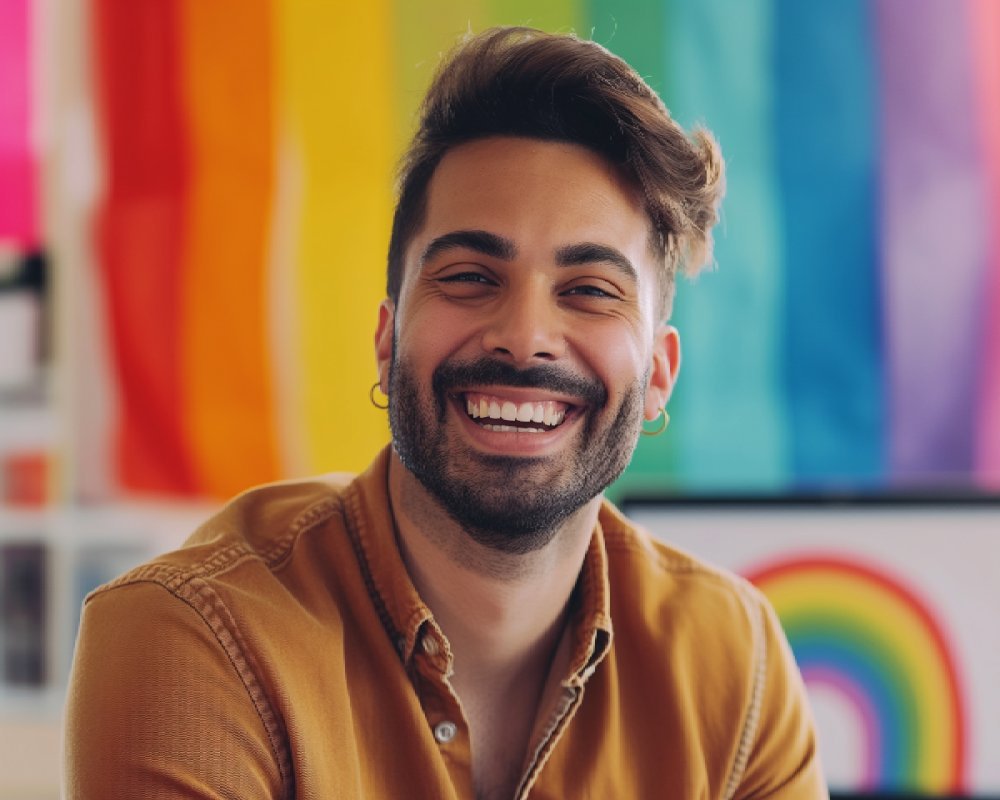
Compare LGBT Rights in Israel & Palestine
The legal and social landscapes for LGBTQ+ rights vary widely across the globe, and the stark differences between Israel and the State of Palestine illustrate this contrast vividly. While Israel is often seen as a haven for LGBTQ+ rights in the Middle East, Palestine presents a far more challenging environment for its LGBTQ+ community. This blog aims to provide an in-depth comparison of LGBTQ+ rights in these two regions, examining laws, social attitudes, and broader human rights contexts.
LGBTQ+ Rights in Israel
Israel is widely regarded as one of the most LGBTQ+-friendly countries in the Middle East. Over the past few decades, the country has made significant strides in ensuring legal protections and social acceptance for its LGBTQ+ citizens.
Legal Protections
- Decriminalization: Homosexuality has been legal in Israel since 1988.
- Anti-Discrimination Laws: LGBTQ+ individuals are protected under anti-discrimination laws in employment, education, and public services.
- Military Inclusion: Israel allows LGBTQ+ individuals to serve openly in the military.
- Adoption and Parenting: Same-sex couples can adopt children and access surrogacy services under certain conditions.
Social Climate
- Pride Parades: Cities like Tel Aviv are famous for their vibrant Pride celebrations, attracting attendees from around the world.
- Representation: LGBTQ+ individuals are increasingly visible in media, politics, and culture.

LGBTQ+ Rights in Palestine
In stark contrast, LGBTQ+ rights in Palestine face significant legal and social barriers. The situation differs between the West Bank and Gaza Strip, with varying legal frameworks and levels of societal acceptance.
Legal Status
- West Bank: Same-sex relationships are not explicitly criminalized under Jordanian Penal Code No. 16 of 1960.
- Gaza Strip: Homosexuality is illegal under Article 152 of the Penal Code of 1936, with punishments including imprisonment.
Social Challenges
- Conservative Norms: Societal attitudes in both regions are deeply conservative, viewing homosexuality as taboo.
- Violence and Harassment: LGBTQ+ individuals often face discrimination, harassment, and even physical violence.
- Lack of Support: There are limited resources and organizations available to support LGBTQ+ individuals.
Advertisement · Scroll to continue
Recommended
Table: Comparison of LGBTQ+ Rights in Israel and Palestine
| Category | Israel | Palestine |
|---|---|---|
| Decriminalization | Homosexuality decriminalized since 1988. | Legal in the West Bank; illegal in Gaza Strip. |
| Anti-Discrimination | Comprehensive anti-discrimination laws. | No legal protections against discrimination. |
| Same-Sex Marriage | Not legally recognized, but same-sex marriages performed abroad are recognized. | Not recognized; no legal framework exists. |
| Adoption Rights | Same-sex couples can adopt under certain conditions. | No adoption rights for same-sex couples. |
| Military Inclusion | LGBTQ+ individuals can serve openly. | No policy regarding LGBTQ+ individuals in the military. |
| Social Acceptance | Growing acceptance; Tel Aviv hosts one of the world’s largest Pride parades. | Societal attitudes remain conservative; homosexuality is heavily stigmatized. |
| Freedom of Expression | LGBTQ+ activists have significant freedom to organize and advocate. | Activists face threats, censorship, and violence. |

WHAT ARE LGBTQ Rights in Israel and Palestine?
Israel
Israel’s LGBTQ+ rights are among the most progressive in the region. Despite not legalizing same-sex marriage, the government recognizes same-sex marriages performed abroad and extends many benefits to same-sex couples. Anti-discrimination laws provide legal recourse for individuals facing prejudice based on their sexual orientation or gender identity.
Palestine
Palestine’s legal framework offers no explicit protections for LGBTQ+ individuals. In the West Bank, same-sex relationships are not criminalized but remain socially unacceptable. In Gaza, same-sex relationships are illegal, with penalties including imprisonment. LGBTQ+ individuals in Palestine face severe societal stigma, limiting their ability to live openly.
Is It True That Palestine Legalized the LGBTQ+ Community?
No, Palestine has not legalized the LGBTQ+ community or same-sex relationships. While homosexuality is not explicitly prohibited in the West Bank, there are no legal protections or recognitions for LGBTQ+ individuals. In Gaza, same-sex relationships are criminalized, reflecting the conservative societal norms that dominate the region.

Advertisement · Scroll to continue
Recommended
Human Rights in Israel and Palestine
The broader context of human rights in Israel and Palestine affects LGBTQ+ individuals in both regions. While Israel provides extensive rights and protections for its LGBTQ+ population, Palestine’s LGBTQ+ community faces significant challenges due to legal and social barriers.
Key Human Rights Issues
- Israel: Despite progress, LGBTQ+ individuals in Israel still face challenges, including unequal access to marriage rights and ongoing societal prejudice in certain conservative communities.
- Palestine: LGBTQ+ rights are often overshadowed by broader human rights struggles, including political instability and gender inequality.
International Perspectives
The international community has praised Israel for its advancements in LGBTQ+ rights while criticizing Palestine for its lack of protections. Human rights organizations like Amnesty International and Human Rights Watch advocate for greater inclusion and legal protections for LGBTQ+ individuals in both regions.
Global Advocacy
- Israel: Seen as a leader in LGBTQ+ rights in the Middle East, often referred to as a “safe haven” for LGBTQ+ individuals.
- Palestine: Activists and organizations face immense challenges in advocating for LGBTQ+ rights due to societal and legal restrictions.

Hope for the Future
While the divide between Israel and Palestine regarding LGBTQ+ rights is stark, there is hope for progress:
- Increased Dialogue:
- Discussions around LGBTQ+ rights are gaining traction, especially among younger generations.
- Global Support:
- International advocacy groups continue to push for greater protections and visibility for LGBTQ+ individuals in Palestine.
- Activism:
- Organizations in both regions are working tirelessly to improve conditions for LGBTQ+ communities, often at great personal risk.
Conclusion – Compare LGBT Rights in Israel & Palestine
The comparison of LGBTQ+ rights in Israel and Palestine highlights a striking disparity in legal protections and societal acceptance. While Israel has established itself as a beacon of progress in the region, Palestine’s LGBTQ+ community continues to face significant challenges. Understanding these differences underscores the importance of advocacy and solidarity in promoting equality and human rights for all individuals, regardless of their location or identity.
Advertisement · Scroll to continue

More Recommended
What is the largest race in the world?
What is the largest race in the world? – The question “What is the largest [...]
Inside the World of Gay Marketing: How LGBTQ+ Agencies are Shaping Advertising
Inside the World of Gay Marketing: How LGBTQ+ Agencies are Shaping Advertising The world of [...]
The benefits of being a Lesbian-friendly business
The benefits of being a Lesbian-friendly business In today’s fast-paced and competitive business landscape, it [...]
Gay Knock Knock Jokes: Top Gay Knock Knock Jokes
Gay Knock Knock Jokes: Top Gay Knock Knock Jokes – LGBTQ+ Humor That Knocks Proudly [...]
Entrepreneurial Pride: The Success Stories of Lesbian-Owned Businesses in Marketing
The LGBTQ+ community has always been a powerful force in the world of marketing. With [...]
How To Increase Sales With LGBT Marketing And Ads?
In today’s competitive market, businesses must embrace diversity and inclusivity to connect with a broader [...]
Why Are Gay Stereotypes Harmful?
Why Are Gay Stereotypes Harmful? – Stereotypes have always been a prevalent issue in society, [...]
What Are the Best Gay Bars in America?
What Are the Best Gay Bars in America? – Looking for the best gay bars [...]
How Businesses Can Better Serve the Lesbian Community
How Businesses Can Better Serve the Lesbian Community As the LGBTQ+ community continues to gain [...]